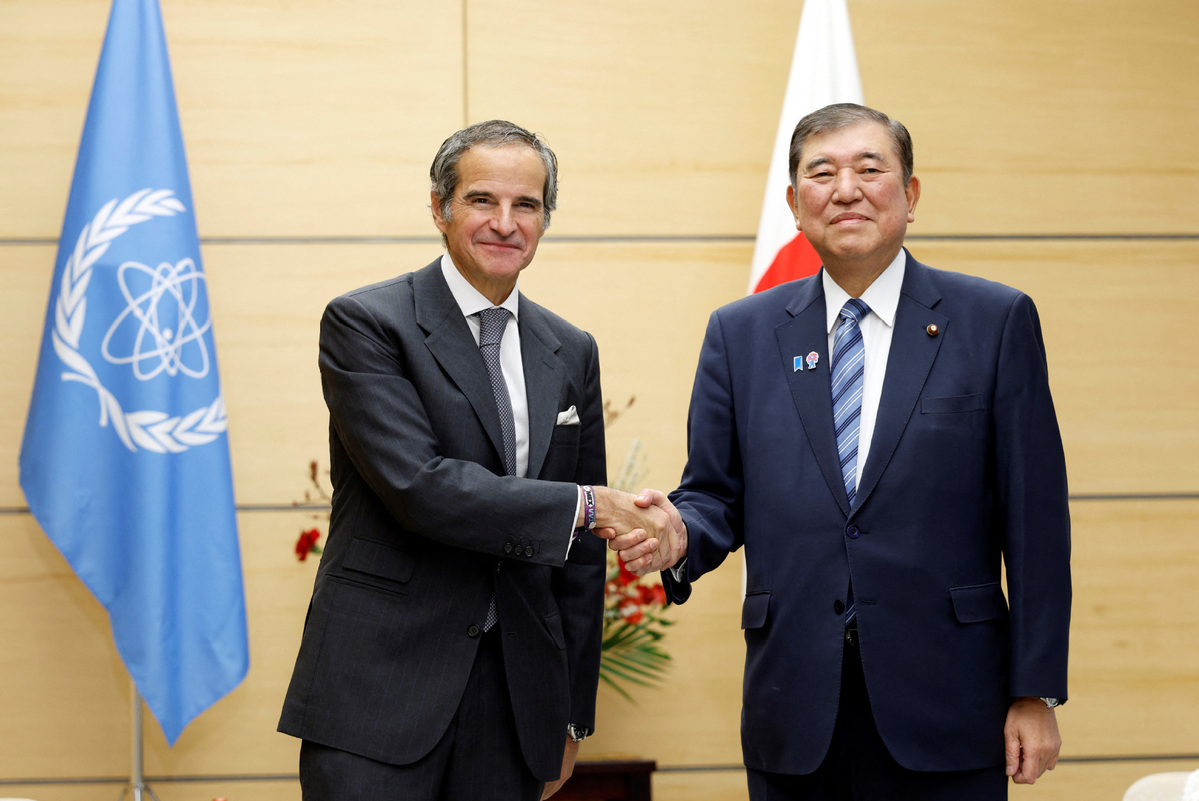
Japan's Prime Minister Shigeru Ishiba shakes hands with International Atomic Energy Agency Director-General Rafael Grossi at the start of their meeting at the prime minister's official residence in Tokyo, Japan, February 20, 2025. [Photo/Agencies]
As part of additional measures under the framework of the International Atomic Energy Agency, officials from the agency and experts from third-party laboratories visited Japan from Wednesday to Friday to collect samples, according to Japan's Ministry of Foreign Affairs.
On Wednesday, IAEA officials and experts from laboratories in China, the Republic of Korea, and Switzerland sampled seawater in the vicinity of the crippled Fukushima Daiichi nuclear power station, operated by the Tokyo Electric Power Company. IAEA Director-General Rafael Grossi, who was on a working visit to Japan, oversaw the sampling, the ministry said in a press release on Friday.
On Thursday, IAEA officials and experts from the aforementioned laboratories selected the landed fishery products at a fishing port in Fukushima Prefecture for examination.
On Friday, IAEA officials and experts from laboratories in China, France, ROK, and Switzerland collected samples of so-called "ALPS-treated" water before dilution from measurement/confirmation tanks located on the Fukushima plant premises, according to the ministry.
At a regular news conference on Thursday, China's Foreign Ministry spokesman Guo Jiakun confirmed that, organized by the IAEA, scientists from China and other countries have been independently collecting samples of nuclear-contaminated water intended for discharge, as well as seawater. They have also been involved in sampling marine life from the discharge facility at the Fukushima Daiichi nuclear power station and its nearby waters.
"This is part of the steps that Japan has promised to take on the issue of the discharge of the Fukushima nuclear-contaminated water into the sea," Guo said.
He emphasized that the release of the Fukushima nuclear-contaminated water is a complex and highly scientific issue involving many aspects.
"To fully assess the impact of the discharge in a science-based way, Chinese scientists, organized by the IAEA, collected different kinds of samples, including the seawater and marine life samples in the vicinity of the discharge outlets and the nuclear-contaminated water to be discharged at the discharge facility of the power plant," Guo said. He reaffirmed China's commitment to working with the international community to improve relevant arrangement.
"Going forward, we will keep you updated on the progress of the ongoing international monitoring of the nuclear-contaminated water and China's independent sampling and monitoring," he added.
Speaking at a news conference at the Japanese National Press Club in Tokyo on Thursday, Grossi, head of the IAEA, acknowledged that China and other nations have continued to express concerns over the monitoring system for ocean discharge and have shown a desire to play a more active role.
In response, he proposed expanding opportunities within the IAEA's established system. This would allow experts from China and other interested countries — particularly those from laboratories that normally work with the IAEA on these matters — to participate, collect their own samples, send them to their home countries, and conduct independent evaluations.
"I'm very satisfied and also grateful for the Chinese understanding and the participation of their experts," he said.
jiangxueqing@chinadaily.com.cn